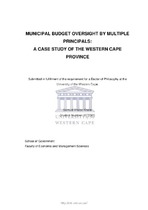| dc.description.abstract | The transformation of local government in South Africa has established a complex model of multiple principals exercising municipal budget oversight on municipal managers. However, earlier research has not sufficiently focused on the phenomenon of the multiplicity of principals and its wider institutional architecture, relationship dynamics and effects in order to understand the institutional constellations of oversight principals, their behaviour and their interactions on the municipal budget process. Particularly, an empirical exploration focusing on understanding the experiences and perceptions of municipal managers and oversight principals on oversight through the multiple principal model remains elusive.
The aim of this study was to explore and describe the experiences and perceptions of municipal managers, municipal councillors and the Provincial Treasury on the multiple oversight principals’ model, its manifestations, dynamics and effects on municipal budget oversight. The study utilised principal-agent theory to develop a conceptual and theoretical framework, and utilised the interpretive qualitative case study of the Western Cape to guide the research process. A sample of respondents consisting five (5) municipal managers, one (1) Provincial Treasury representative and ten (10) municipal councillors from municipalities in the Western Cape were interviewed for the study. The transcribed data from the 16 interviews were analysed, using a qualitative analysis method.
The study findings reaffirmed the existence of multiple principals bequeathed with authority to exercise of municipal budget oversight in the Western Cape Province. Strong evidence emerged that application of the multiple principal model manifests independent, conflicting and fragmented budget oversight relationships and behaviour between the Provincial Treasury and municipal councillors during different stages of the municipal budget process. While the study acknowledges that the model and its application generates both positive and negative effects resulting in too complex, onerous and conflict-prone oversight relationships, it also highlighted these effects as necessary intrinsic
attributes that do not necessarily have to manifest adverse consequences on the municipal budget oversight.
These findings contradict the common-sense advocates for a collective model that emphasises coordination to improve cohesiveness among oversight principals, especially between the Provincial Treasury and the municipal councillors. The findings confirm that the Municipal Finance Management Act has consciously established a responsive system that distributes oversight among autonomous political structures in order to comprehensively eclipse the discretion of the municipal manager with varied and complementary oversight expertise, energy and diversity. | en_US |

